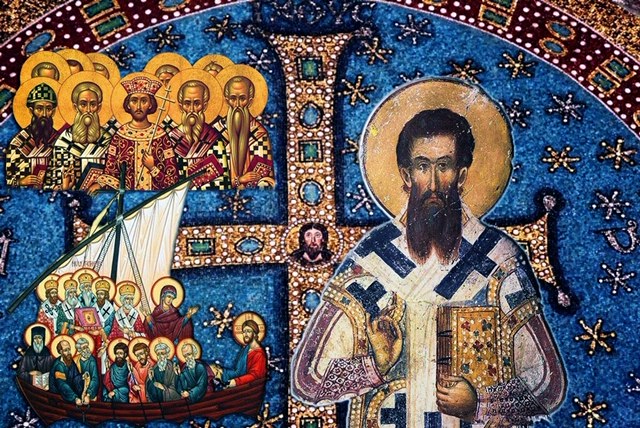
We honor today a great Father of our Church, St. Gregory Palamas, Archbishop of Thessalonika. St. Gregory, in keeping with the example of the Holy Fathers of the Church, confronted the heresies of his time to defend Orthodox doctrine. This is why the Church has designated the Second Sunday of Great Lent to commemorate his memory, in extension of the previous Sunday of Orthodoxy.
St. Gregory was born in Constantinople in 1296. His father was a senator and trusted advisor to the emperor, who died when his son was only 7 years old. This is how Emperor Andronikos II took guardianship of the young Gregory, who was the same age as his own son. It was in this arrangement that a high position in the imperial court seemed assured. St. Gregory was distinguished in his studies of philosophy, but at the age of twenty he instead turned to asceticism under the guidance of the Bishop of Philadelphia. He went to a monastery on Mount Papikion in Thrace, and later resided on Mount Athos as a monk. When heresies began to appear in Thessaloniki, he was forced to abandon this quiet life and take up the struggle against these false teachings. For years he had been in conflict with the monk-philosopher Barlaam of Calabria (in Italy), who had gone to Thessaloniki and was distorting Orthodox doctrines. Barlaam also maliciously waged war against hesychasm and mental prayer. In order to defend Orthodox belief on these issues, and make them understandable to all, St. Gregory wrote many books. His works on the Holy Spirit, the Uncreated Light, Hesychasm, and other themes are Orthodox spiritual classics. The result of this work was the defeat of Barlaam, who was compelled to apologize for his views and return to Italy.
In 1326, St. Gregory was ordained as a priest and later became an Archbishop. He was remarkable not only for his academic work and writings on Orthodoxy, but also for his pastoral work. He strived for the spiritual welfare of his flock, and was an example for them through his holy life. He died on November 14th, 1359 at the age of 63. In the eyes of the faithful he was already a Saint, and his reputation as one became widely known through the many miracles done by his intercession. St. Gregory was formally declared a Saint by the Ecumenical Patriarchate in 1368. His sacred relics were placed in the Metropolitan Cathedral of Thessaloniki, where they remain to this day. Among the works of St. Gregory that have come down to us are his Homilies. To get a better sense of who St. Gregory is, let us read some of his sweet words from the 56th Homily on the Holy Mysteries. Particularly during this time of Great Lent, it is beneficial for us to hear more about this topic.
St. Gregory writes:
Just as the earth first needs to be cultivated, prepared and then sown to bear fruit, so must we prepare for the mystery of divine Eucharist (Thanksgiving). The preparation for us is mental and consists of repentance, the most important of which of which is confession. That is why it is necessary, brethren, that each of you have a spiritual father and come to him in faith. Be humbled before him and reveal to him the wicked passions of the heart, accepting the spiritual healing that removes these deep-rooted thorns and sources of sin, which nourished you with a lustful and sinful life.
Let us cleanse ourselves first, brothers, not only in the body but also in the mouth and mind. Let us come to receive Holy Communion with a good and pure conscience…Let us come after washing not only the body but also the dirt in our soul. Because this is how we come to salvation…
With Holy Communion, let us mix our blood with the blood of God, in order to destroy the corruption within it; for in this Holy Blood of Christ there is a blessing beyond words. This makes us young and everlasting, immortal and evergreen, like trees planted to the currents of the Divine Spirit, from which springs eternal life.
This is why we must not only purify ourselves first before approaching, but also after receiving this divine gift of the Holy Eucharist. It is important to cautiously take care of ourselves, in order to remain dominant over the passions and preach the virtues. Let us think about Who we were united with, and what we were so desperate to receive, amazed at how great the love of Our Lord is in this divine gift. May we also turn our actions, thoughts and words towards “that good and acceptable and perfect will of God” (Romans 12:2).





